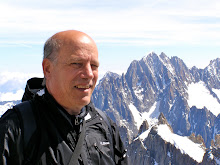Just when it seemed things couldn't get worse
03/29/05
There has been little national exposure for a Miami Herald report that Jeb Bush sent state law enforcement agents to seize Terri Schiavo from the hospice - a plan called off when local police said they would enforce the judge's order that she remain there.
-- Paul Krugman, New York Times
That would be George W.'s brother, governor of Florida -- and, as likely as not, the next Republican presidential candidate. Breathe deeply. We came close to initiating the actions of a police state over the life of a woman who has spent 15 years in a vegetative state and whose husband has won years of legal battles granting her the right to die.
The governor did this after the highest court in the land, the Supreme Court, refused to intervene. He did this despite the fact that an overwhelming majority of Americans consider this a family issue, one thousands if not millions have planned for with Living Wills (including, according to one report, Laura and George W. Bush).
What comes next, Paul Krugman is right to ask. Intimidation? Political assassination? Religious McCarthyism? Or is that already here, full blown?
It's hard for me to recognize the country I live in. The President, the man who governed Texas as it led the nation in executing inmates, the man who couldn't be bothered to leave his vacation compound to speak to the world and the families of tsunami victims, the man who led us to war under false premises in Iraq, flew from Texas to Washington, D.C., to sign legislation to make the life of Terri Schiavo a federal case and a federal cause.
For awhile, the whole story seemed too weird for me to take in. I confess. I spent three days hoping the Terri Schiavo story would go away. No chance. Instead it got more front-page ink than the election in Iraq, more than the battle over Social Security, more even than Michael Jackson's trial. The Republicans wanted it that way, reportedly sending a memo saying it was a good story to shore up the party's base (although right-wing bloggers now are questioning the authenticity of this memo). And so, as the Democrats stayed somewhere in their underground bunkers, once again abdicating any sense of true leadership, the Republican right trotted out its crazies in full force, got a 10-year-old arrested trying to break into Terri Schiavo's room to "give her water," forced her husband's brother to hide in the face of death threats and, apparently, convinced the governor of Florida to ask state law enforcement agents to ignore the courts and break the law.
Think about it -- think about it closely. At a time when Republicans are on the cusp of scrapping the filibuster in the Senate and are working hard to infiltrate, distort and discredit a fact-based, skeptical press, this is truly scary news. Who needs conspiracy theories when reality abounds?
There has been little national exposure for a Miami Herald report that Jeb Bush sent state law enforcement agents to seize Terri Schiavo from the hospice - a plan called off when local police said they would enforce the judge's order that she remain there.
-- Paul Krugman, New York Times
That would be George W.'s brother, governor of Florida -- and, as likely as not, the next Republican presidential candidate. Breathe deeply. We came close to initiating the actions of a police state over the life of a woman who has spent 15 years in a vegetative state and whose husband has won years of legal battles granting her the right to die.
The governor did this after the highest court in the land, the Supreme Court, refused to intervene. He did this despite the fact that an overwhelming majority of Americans consider this a family issue, one thousands if not millions have planned for with Living Wills (including, according to one report, Laura and George W. Bush).
What comes next, Paul Krugman is right to ask. Intimidation? Political assassination? Religious McCarthyism? Or is that already here, full blown?
It's hard for me to recognize the country I live in. The President, the man who governed Texas as it led the nation in executing inmates, the man who couldn't be bothered to leave his vacation compound to speak to the world and the families of tsunami victims, the man who led us to war under false premises in Iraq, flew from Texas to Washington, D.C., to sign legislation to make the life of Terri Schiavo a federal case and a federal cause.
For awhile, the whole story seemed too weird for me to take in. I confess. I spent three days hoping the Terri Schiavo story would go away. No chance. Instead it got more front-page ink than the election in Iraq, more than the battle over Social Security, more even than Michael Jackson's trial. The Republicans wanted it that way, reportedly sending a memo saying it was a good story to shore up the party's base (although right-wing bloggers now are questioning the authenticity of this memo). And so, as the Democrats stayed somewhere in their underground bunkers, once again abdicating any sense of true leadership, the Republican right trotted out its crazies in full force, got a 10-year-old arrested trying to break into Terri Schiavo's room to "give her water," forced her husband's brother to hide in the face of death threats and, apparently, convinced the governor of Florida to ask state law enforcement agents to ignore the courts and break the law.
Think about it -- think about it closely. At a time when Republicans are on the cusp of scrapping the filibuster in the Senate and are working hard to infiltrate, distort and discredit a fact-based, skeptical press, this is truly scary news. Who needs conspiracy theories when reality abounds?

